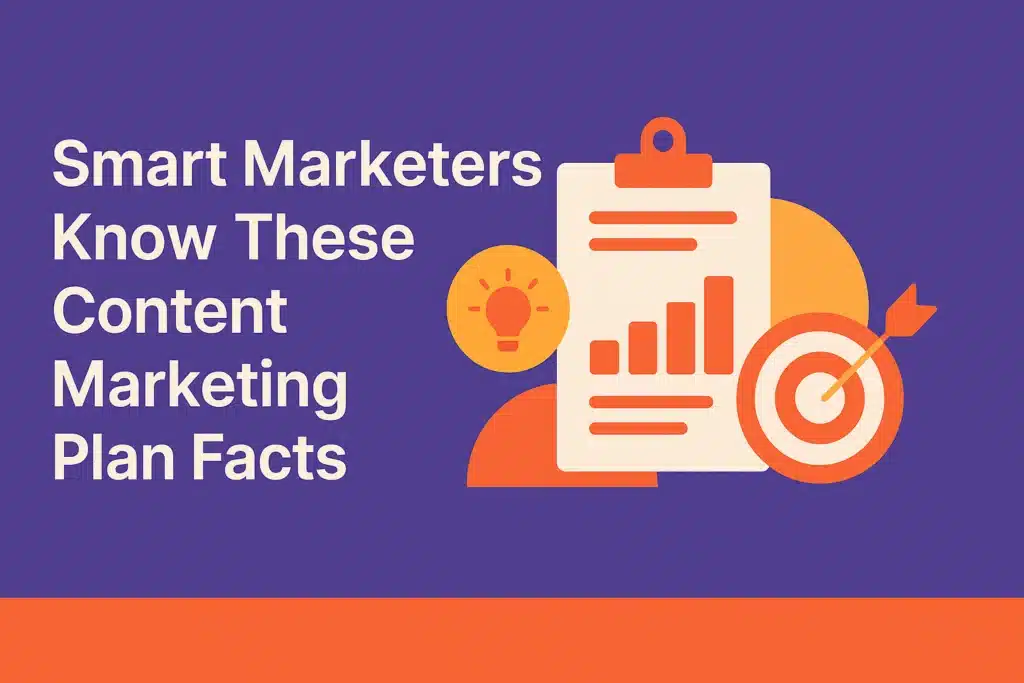Welcome! Today’s marketers look for effective approaches to connect and retain audiences who need authentic insights instead of hollow pitches. Focusing on a content marketing plan enables you to share perspectives that guide each segment of the buyer’s journey. By exploring modern trends, picking best formats, and tracking key metrics, you drive stronger brand connections.
Many businesses favor clear content strategies because well-structured plans address audience needs accurately. Thoughtful messages help your brand shine in a competitive landscape. Let’s review the must-know facts, research findings, and techniques you can apply to truly boost your content marketing impact.
AI Content Marketing Statistics
Over 80% of marketers worldwide apply AI for content marketing tasks, saving time and boosting creative output (Typeface). That widespread adoption highlights AI’s rising influence and regularly encourages more data-driven content decisions.
How is a content strategy different from a content marketing plan?
A content strategy outlines goals, target groups, and guidelines, while a content marketing plan focuses on producing and sharing content that meets those aims. Both elements strongly support each other (AIContentfy).
Why does every business need a content marketing plan today?
Companies rely on a content marketing plan to attract leads, build loyalty, and compete in busy channels. A structured approach creates valuable content that fosters brand trust and consistent engagement.
1. Define your goals and target audience
Clear goals guide every content marketing plan. Identify audience profiles, their pain points, and your campaign goals. This step helps shape topics, styles, and messaging, ensuring much precise outcomes (SurveyMonkey).
2. Choose the right types of content marketing
Blogs, videos, infographics, podcasts, and e-books address varied audience preferences. Some companies adopt short pieces for quick reads, while others produce detailed case studies for complex decisions and sales (Content Marketing Institute).
3. Craft your inbound marketing strategy carefully
Inbound marketing strategy draws interested leads by offering valuable insights. Integrate SEO, blog publishing, and nurturing emails to build trust and strengthen engagement, successfully guiding prospects through every funnel stage (Forbes Advisor).
4. Build and run an editorial content calendar
An editorial calendar arranges your schedule, contributors, and asset formats. Track updates, track performance, and store ideas in one place. This process improves consistency, improves quality, and grows reach (Content Marketing Institute).
5. Measure performance to improve your strategy over time
Use essential metrics such as conversions, traffic sources, and audience retention to improve your content marketing plan. Data-driven reviews reveal what resonates, allowing quick adjustments and deeper brand connections (Content Marketing Institute).
17 Reasons You Need to Use Content Marketing
Businesses often rely on content marketing to stand out and build stronger relationships. It raises brand engagement, boosts credibility, and improves conversions across channels, making it a truly key modern marketing approach.
There are over 33 million small businesses in the United States, making up over 99% of all American businesses
These countless small ventures fuel economic growth through job creation and frequent local new ideas. Content marketing supports their outreach goals, helps create unique brand voices, and reaches audiences on limited budgets.
91% of businesses use video as a marketing tool
Videos grab attention more quickly than text for viewers. They present product demos, real-life reviews, and compelling stories, leading to stronger conversions and better audience and brand retention online.
Over 91% of people in the U.S. use at least one social media site
Social networks drive modern communication. Companies rely on these platforms to share brand news, client stories, and valuable information. This approach expands reach, fosters engagement, and enhances stronger customer relationships successfully.
71% of B2B marketers say content marketing has become more important to their company in the last year
B2B teams see content as a credible path to deliver deeper insights and discover new buyers. Strategic messaging helps them display solutions, strengthen knowledge sharing, and further stand out (NYT Licensing).
Internet users spend an average of 2.5 hours on social media every day
This figure shows the power of social platforms. Regular posting, engagement, and tailored responses boost brand visibility, start conversations, and build important connections that can shape consumer decisions and loyalty over time.
64% of web traffic comes from mobile devices
Mobile improvement is essential. Sites that load quickly, use clear navigation, and feature responsive layouts keep users engaged. This structure provides a stronger user experience and higher retention on phones and tablets.
82% of consumers feel more positive about a company after reading custom content
Custom pieces address specific concerns and interests. By sharing tips, case examples, or expert viewpoints, businesses show understanding, build rapport, and encourage audiences to view them as trusted resources for future needs.
70% of consumers feel closer to a company because of content marketing
Authentic engagement fosters loyalty. Engaging social posts, newsletters, and custom campaigns give audiences a sense of belonging, which drives them to interact more frequently and maintain continued brand connections and future purchases.
96% of B2B marketers use LinkedIn to distribute content
LinkedIn supports dialogue, thought leadership, and networking. Sharing case studies, expert opinions, and data-driven reports can attract like-minded people, generate leads, and highlight industry know-how among key stakeholders, building more brand credibility.
Over 99% of shoppers research purchases online before making a buying decision
Online reviews, detailed product descriptions, and how-to guides boost buyer confidence. Good stories address buyer queries beforehand, removing doubts and helping with conversion in a more informed manner and steady trust.
45% of potential buyers won’t make a purchasing decision if there are no reviews
Peer opinions shape modern buying. Even a few positive comments can reassure hesitant prospects. Encouraging users to share feedback builds realness, making prospective clients more open to trying a new product offer.
87% of marketers say video has a direct, positive impact on sales
Video displays product features, tells vivid success stories and examples, and supports brand realness. Viewers can understand solutions quicker, accelerating decision-making and often leading to immediate revenue gains across diverse market segments.
83% of marketers say it’s better to focus on content quality over quantity
High-quality pieces connect longer and earn more shares. Thoughtful research, consistent tone, and practical advice lead to deeper reader involvement. One well-executed post often works better than multiple underprepared articles on targeted platforms worldwide.
43% of people use the internet to research products and brands
Online research precedes many purchases. Detailed product comparisons, success stories, and brand history influence buyers. By producing fact-based content and user success examples, companies guide informed decisions and improve trust even further.
63% of respondents reported success in content marketing building a growing loyalty with existing clients and customers
Repeat business depends on strong relationships. Consistent updates, fresh ideas, and timely tips keep clients engaged. Positive experiences often lead to referrals and loyalty, strengthening a brand’s standing in busy global markets.
74% of online consumers get frustrated with websites when offers, ads, and promotions appear to have nothing to do with their interests
Irrelevant content interrupts user experiences. Custom recommendations guarantee visitors see solutions matching their needs. Online shoppers often favor platforms that quickly direct them toward useful products and avoid needless distractions or confusion.
86% of marketers said that their social media marketing gave more exposure to their businesses
Social campaigns expand brand visibility, attracting audiences who actively regularly browse feeds. By sharing informative short posts or engaging stories, marketers spark conversations and inspire more viewers to learn about offered solutions.
How to create a content strategy that delivers results
Marketers refine outcomes by basing each content decision in audience insights, brand goals, and competitor analysis. A tested approach guides production plans, sharing channels, and performance checks for sustained improvement and growth.
Why Learning From Your Competitors Is Key
Observing competitors reveals which offers succeed or fail. Studying their pricing, promotions, and customer responses reveals chances and gaps. Adapting these findings drives better customer service and helps refine unique placement (FIVECRM).
Start from core brand messaging and customer journey stages
Identify central themes that match your brand voice and map them to important interactions. Align each piece with the buyer’s stage, offering vital information that sparks interest or supports final purchase decisions.
Pick the best content formats for each phase
Match initial needs with awareness-oriented blog posts or short clips. Offer in-depth case studies or webinars before conversion. Diversify formats to serve different likes and drive consistent progress and audience engagement (Storyly).
Track results using key content KPIs
Use metrics customized to goals: website visits, leads generated, or social exchanges. Identify best assets and copy their strengths. Regular reviews highlight improvement areas, driving ongoing refinements and strategic updates (NYT Licensing).
Conclusion
Building a content marketing plan requires matching goals, understanding your audience, and choosing tactics carefully. Review findings frequently and adapt. Select varied content, measure results, and consider AI for efficiency and custom approach. Truly valuable engagement helps secure a lasting brand presence.
FAQs
What is the role of a content marketing plan in inbound strategy?
How often should I update my content strategy?How often should I update my content strategy?
What types of content marketing work best for new businesses?
How do I align my content strategy with marketing goals?
Can inbound marketing and content strategy work separately?
What’s the difference between a strategy and a plan in content?

Ridam Khare is an SEO strategist with 7+ years of experience specializing in AI-driven content creation. He helps businesses scale high-quality blogs that rank, engage, and convert.



